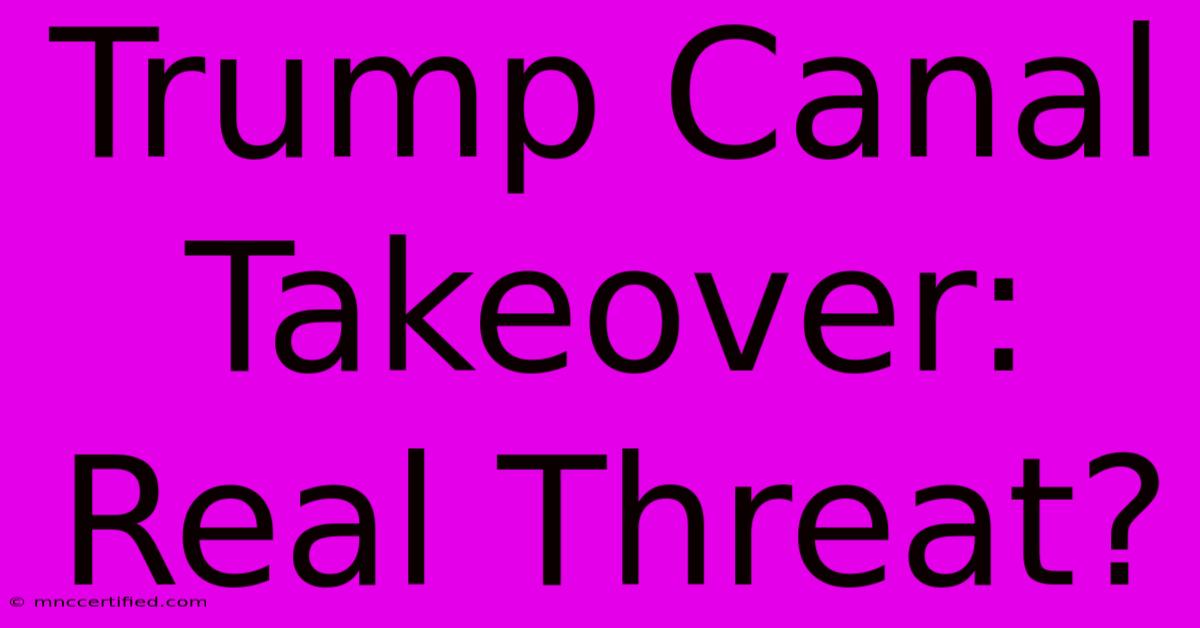Trump Canal Takeover: Real Threat?

Table of Contents
Trump Canal Takeover: Real Threat or Political Maneuvering?
The idea of a former US President seizing control of the Panama Canal has sparked intense debate. Is this a realistic threat, or simply inflammatory rhetoric? Let's delve into the facts and separate speculation from potential reality.
Understanding the Panama Canal's Status
The Panama Canal is a crucial waterway, connecting the Atlantic and Pacific Oceans. Crucially, it's not owned or controlled by the United States. Panama regained sovereignty over the Canal in 1999, a significant milestone in its history. The Panama Canal Authority (ACP), a Panamanian government agency, operates and manages the canal. Any attempt to seize control would represent a blatant violation of international law and Panamanian sovereignty.
The Source of the Speculation: Analyzing Trump's Statements
Claims of a potential Trump Canal takeover often stem from his past statements and actions. While he hasn't explicitly stated an intention to seize the canal, some interpret his rhetoric on reclaiming American influence in Latin America as a potential precursor to such an action. However, context is vital. Such statements must be analyzed within the broader framework of his political messaging and his known tendencies toward strong rhetoric.
Examining the Feasibility: Logistical and Political Hurdles
Even setting aside the legal and ethical implications, a forceful takeover faces insurmountable logistical and political obstacles:
- Military Intervention: A US military operation to seize the Canal would require a massive military undertaking, facing significant international condemnation and potential retaliatory actions. The cost, both financially and politically, would be astronomical.
- International Relations: Such an action would irreparably damage US relations with Panama and other countries, significantly impacting global trade and diplomacy. It would likely trigger strong responses from international organizations like the UN.
- Domestic Opposition: Even within the United States, such a move would likely face significant bipartisan opposition, given the potential for international conflict and the violation of established international norms.
The Real Threat: Economic and Political Influence
While a direct takeover is highly improbable, a more subtle form of influence remains a concern. The Trump administration, and indeed future administrations, could attempt to exert economic or political pressure on Panama to sway the Canal's operations in a manner favorable to US interests. This could involve:
- Trade Sanctions: The imposition of trade sanctions against Panama could pressure the ACP to make decisions that align with US priorities.
- Economic Aid: Offering economic aid with strings attached could also subtly influence the ACP's decision-making process.
- Diplomatic Pressure: Strong diplomatic pressure could be exerted to prioritize US interests in the allocation of canal resources or operational decisions.
These indirect methods represent a more realistic, albeit less dramatic, threat to the Canal's autonomy.
Conclusion: Probability and Preparedness
While a direct military takeover of the Panama Canal by a former or current US President is highly unlikely, the possibility of indirect influence and pressure remains a real concern. It's essential to remain vigilant and monitor developments in US-Panama relations, emphasizing the importance of upholding international law and respecting Panama's sovereignty over this critical waterway. The true threat isn't necessarily a dramatic seizure, but rather the subtle erosion of Panamanian control through economic and political leverage. This requires sustained international attention and a commitment to maintaining a stable and equitable system for the operation of the Panama Canal.
Keywords: Trump, Panama Canal, Takeover, Sovereignty, International Law, Political Maneuvering, Economic Influence, US-Panama Relations, Geopolitics, ACP, Panama Canal Authority, Military Intervention, Trade Sanctions, Diplomatic Pressure.

Thank you for visiting our website wich cover about Trump Canal Takeover: Real Threat?. We hope the information provided has been useful to you. Feel free to contact us if you have any questions or need further assistance. See you next time and dont miss to bookmark.
Featured Posts
-
Store Hours Christmas Eve Target Walmart
Dec 24, 2024
-
Festivus Traditions And Meaning
Dec 24, 2024
-
Jacobs Back Among Nfls Top Rbs
Dec 24, 2024
-
Trumps Panama Canal Retake Threat
Dec 24, 2024
-
Cowboys Eagles Time Change 1 Pm Kickoff
Dec 24, 2024